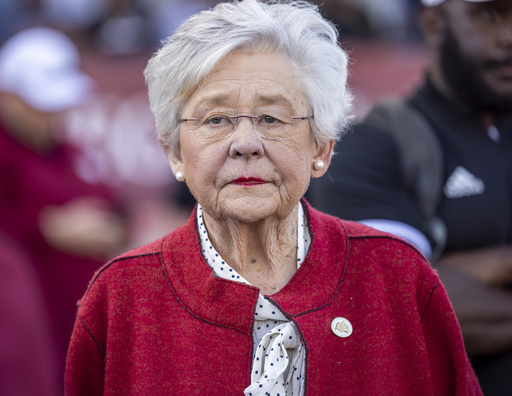MONTGOMERY, Ala. — In light of a tragic year that has seen numerous mass shootings across Alabama, Governor Kay Ivey and legislators from various political affiliations are rallying behind a legislative proposal aimed at banning Glock switches and similar conversion devices. These modifications have the potential to alter semi-automatic firearms, enabling them to function as fully automatic weapons. Ivey is anticipated to advocate for this proposal during her upcoming State of the State address, as part of a comprehensive package focusing on public safety measures, hoping to align Alabama with around 23 other states that have already implemented such prohibitions.
The use of conversion devices, which can be crafted from metal or plastic and are sometimes available for purchase online or produced via 3D printing, has contributed to an increase in lethal shootings throughout the nation. These devices allow for the rapid firing of multiple rounds with a single pull of the trigger, raising concerns over public safety among law enforcement and community leaders. Historically, Alabama Democrats have championed the ban on such devices; however, their proposed legislation has struggled to advance in a predominately Republican legislature that is often hesitant to impose gun control measures.
“Governor Ivey is determined to prevent dangerous Glock switches from falling into the hands of gangs and criminals. She plans to reveal several other public safety initiatives that are designed to bolster law enforcement and tackle crime during her address,” proclaimed Ivey’s spokesperson Gina Maiola. “We anticipate that this legislative package will garner bipartisan support.” The urgency of addressing this issue was underscored by a recent shooting in September that resulted in four fatalities near a lounge in Birmingham, attributed to the use of such conversion devices. Local authorities assert that the indiscriminate firing enabled by these devices raises the likelihood of civilian casualties, eliciting alarm from Birmingham Mayor Randall Woodfin, who called Glock switches “the number one public safety issue in our city and state.”
While federal law already prohibits the use of these devices, proponents argue that state-level legislation would grant local district attorneys the authority to pursue charges rather than defaulting to federal jurisdiction. Representative Phillip Ensler, a Democrat from Montgomery, has reintroduced a bill that would classify possession of Glock switches as a Class C felony, subjecting offenders to a potential ten-year prison sentence. “These devices wreak havoc in our communities. While we can’t bring back lost lives, we can take steps to protect others moving forward,” Ensler stated.
Last year, Ensler’s bill passed the Alabama House but failed to receive a Senate vote by the end of the session. House Speaker Nathaniel Ledbetter expressed optimism for the bill’s passage this year, though Senate Rules Chairman Jabo Waggoner cautioned that resistance remains. “It’s not going to be an easy pass,” Waggoner said. Previous endeavors to legislate against these conversion devices have had mixed outcomes. Last year, Mississippi and Maryland successfully enacted bans, whereas a proposal in Pennsylvania to restrict “multi-burst trigger activators” was narrowly defeated in the House.
Alabama ranks high in gun violence incidents in the U.S., with 1,278 gun-related deaths reported in 2022, placing it fourth in terms of gun death rates, behind states like Mississippi and Louisiana. Olivia Li, Policy Counsel for Everytown for Gun Safety, remarked, “Residents in states with lax gun laws have consistently faced the consequences tied to issues like Glock switches.” Meanwhile, John Commerford, executive director of the NRA Institute for Legislative Action, highlighted that possession of conversion devices is already a felony under federal statutes, emphasizing the existing prosecutorial tools available to address their misuse.
In addition to the conversion switch ban, other public safety proposals expected to be presented include enhanced support for local law enforcement agencies and initiatives aimed at monitoring juvenile defendants. Among these proposals is a “second chance” bill that would permit judges to reevaluate sentences for non-violent offenders serving life sentences under the habitual offender law. Some legislators are advocating for renewed efforts to reduce gun violence, proposing a return to the permit requirement for carrying concealed weapons, which was removed earlier this year.
“It’s time to set aside the political rhetoric and take significant action to address this issue,” Ensler urged. Although there is notable bipartisan endorsement for the conversion device ban, Republican lawmakers have shown little inclination to endorse more extensive gun control measures. “Ultimately, it’s not about the firearms; it’s about the individuals wielding them,” Ledbetter concluded.
